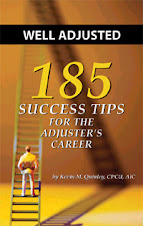Monday, May 7, 2012
Adjusters -- Know the Power of `No'!!
To be effective as a claims professional, sometimes the two most effective words in our vocabulary must be, “No thanks.” Clint Eastwood’s character in Dirty Harry movies uttered the signature line, “A man’s gotta’ know his limitations.”
Good advice! So does any effective adjuster or claim professional.
Hey -- can you serve on the office Social Committee? “No thanks!” (Maybe you’re holding out for a spot on the Party Planning Committee.)
Would you like to accept a volunteer slot with a trade or professional organization that will entail extensive travel? “No thanks!”
Can you take on a project that will wreck your beach vacation plans with your family? “No thanks!”
Can you meet with this group at 5:30 PM to go over a new claim account? “No thanks!”
See, it’s not that hard to say. Practice makes perfect.
The point is to set limits. This is not to be a prima donna, or to come off as one. It is a matter of setting priorities and living intentionally. For every new “yes,” something's gotta’ give. Often, that “something” is an important project or priority in your life.
Of course, use this “no thanks” selectively. There are times when using it can be career-limiting or job threatening. I realize that. I get it. That’s where good judgment enters in. Every guideline has exceptions.
If the boss asks you to take on some duty or project, you may feel that you have no choice. You do have a choice, though.
Think long and hard before telling your boss or a client, “No thanks!” You want to be known as a can-do person, but also take care that your energies are not depleted by becoming over-committed. Remember – a laser beam is more powerful than a flashlight because of the intense focus of the light beams.
In your claims work, are you a laser or a flashlight? Your degree of focus dictates the difference.
Some adjusters have a tough time saying “No.” Many of us are people-pleasers. Insurance claims is a service business. In a service business in a competitive job marketplace, the work culture is very conducive to saying “yes” to every request. You may get the feeling that such a stance will come back to haunt you during performance review time. Effective adjusters know they have limits. Everybody has limits. When one new thing is added to your plate, something else must come off. What will that be? Saying “yes” all the time leads to professional burnout for over-extended adjusters.
Beware of becoming known as “Dr. No.” It’s always best, though, if you can respond to requests with something other than, “No thanks, period.”
Try, “No thanks, but . . .” After the “but,” offer a suggestion or solution. Have professional goals as a claims person. Know what you want. Evaluate each request in light of whether it will help or hinder you reaching your goals.
With the boss, you can always
•
Negotiate for additional time. “Can I get an extension on these other projects …?”
•
Ask what deserves top priority. “Can we re-prioritize the claim analytics project that I have been working on…?”
•
Bargain for removal of some other job task. “If I take this on, can we re-apportion the Smith account to …?”
•
Respectfully decline and explain the reason “I’d love to, but I don’t think I could give it the time and effort it deserves because of …”
In bygone days, it was a given that employees would do just about anything the company asked of them. Demographics – and times – have changed, though. Claim professionals – like others – want balance in their lives. They won’t unthinkingly accept every new adjusting assignment or project. So do not be reluctant to deploy the Nancy Reagan School of Time Management occasionally, “Just say no.”
Have you found it career-limiting or job-threatening to say no? Have you found certain ways of saying “no” to be more effective than others? Is it realistic to say “no,” given the uncertain state of employment these days? Sound off by posting here or responding to claimscoach@gmail.com.
Subscribe to:
Post Comments (Atom)






No comments:
Post a Comment